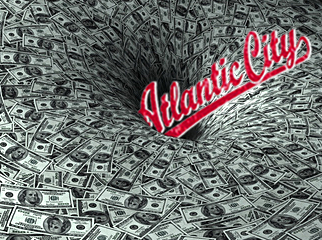 There was a time not too long ago when Atlantic City was a bustling seaside town that was widely hailed as one of the US’ premier tourist destinations.
There was a time not too long ago when Atlantic City was a bustling seaside town that was widely hailed as one of the US’ premier tourist destinations.
It might comes as a surprise to a lot of people, but that was the reality as late as 2006 when Atlantic City’s gambling revenue reached $5.2 billion, a record number that hasn’t come close to being touched since and anytime soon.
Since then, Atlantic City has fallen into the depths of the abyss, struggling to remain relevant in the face of growing competition from neighboring states, a lot of whom have taken a significant chunk of Atlantic City’s luster and have prospered at its expense. Pennsylvania, for one, has been one of the biggest beneficiaries of the AC’s steep decline, overtaking New Jersey last year as the second largest gambling market in the US.
Even Maryland, which wasn’t even on the gambling map in the Northeast when Atlantic City seemingly had a monopoly on the region, now has the highest grossing casino in the region in Maryland Live!, which earned an impressive $55 million in revenues after only one year of being open. That number is higher than any casino in the Northeast, including all 12 of Atlantic City’s casinos.
That’s the kind of grim reality that’s facing the AC these days and no more is that evident these days than the kind of plight it’s supposed savior – Revel Hotel and Casino – has gone through in the year that it’s been open. Unlike Maryland Live!, Revel’s first year of operations was marked with more mistakes and missteps than a Three Stooges episode. It failed to live up to the insanely lofty expectations it carried and was so terrible in marketing itself that it filed for bankruptcy despite being just a year old. To its credit, Revel has since turned an embarrassing about-face, launching a program that welcomed gamblers to play in its casinos with a catchy, if not humiliating, “Gamblers Wanted” marketing campaign.
Revel’s plight is a microcosm of a lot of things that have gone wrong with Atlantic City. It’s gotten so bad that even with business in non-gambling related ventures on the rebound, the town’s lifeblood is still on the decline at an alarmingly huge rate. In the first half of 2013, revenue was off by almost 11 percent compared to last year. Remember when gambling revenue reached $5.2 billion in 2006? That number has markedly gown down since then with 2012 struggling to even reach $3 billion revenue, the lowest its ever been since 1991.
The ills of Atlantic City isn’t going to go away anytime soon. Not with the growing competition that won’t be limited to just Pennsylvania and Maryland in the coming years. Delaware is coming on strong, as are New York and Massachusetts. All three states are in various stages of casino and gambling expansions that would only add to the competition that Atlantic City doesn’t need at this point.
Calls for rebranding Atlantic City as more than just a gambling destination is admirable but it won’t do much in the way of reshaping what people have always thought of it. Atlantic City was, is, and will always be about gambling. No matter how many new malls, theme parks, or convention centers are built, Atlantic City is a gambling town. That’s it’s identity.
And if it can’t stop its lifeblood business from falling more and more into obscurity, it’s going to have a difficult, maybe even close to impossible, task of returning to the opulent acclaim it once enjoyed.
